Key takeaways:
- Aromatherapy uses essential oils to improve physical and emotional well-being, with each oil offering unique benefits.
- Physical health benefits include relief from headaches (eucalyptus), muscle pain (peppermint), and digestive issues (ginger).
- Emotional wellness is supported through oils like lavender for relaxation and citrus oils for mood enhancement, making aromatherapy a valuable self-care tool.
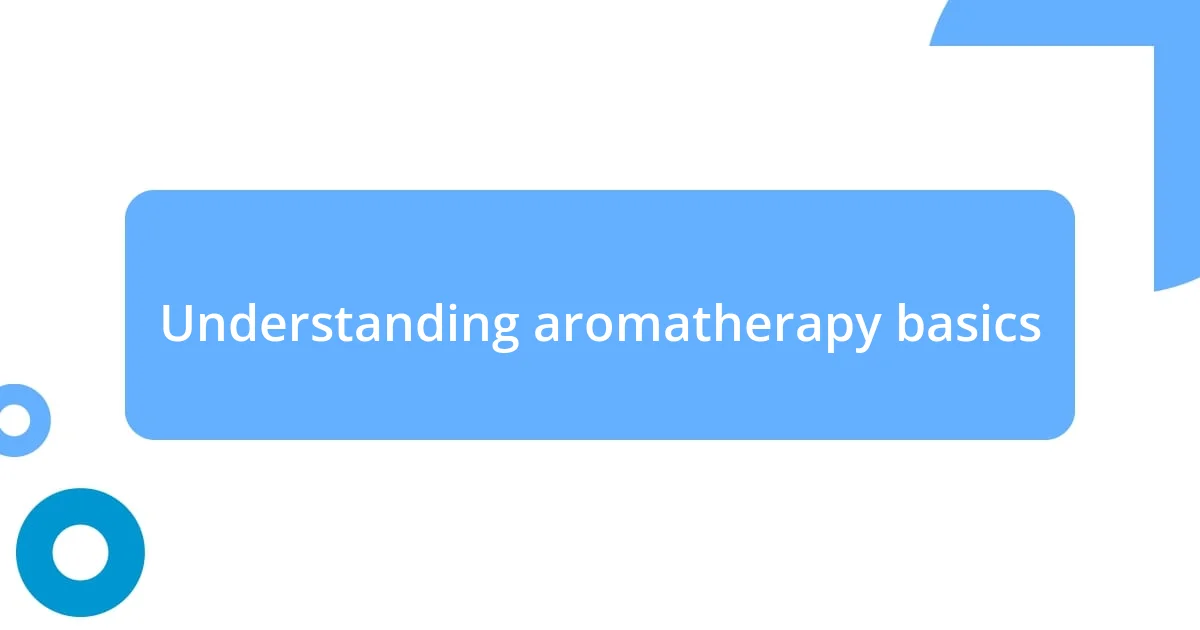
Understanding aromatherapy basics
Aromatherapy is essentially the practice of using essential oils to enhance physical and emotional well-being. Each oil carries its unique properties, and I remember my first experience with lavender oil; it was like a gentle hug after a long day. Have you ever noticed how a particular scent can instantly transport you to a happy memory or place?
At its core, aromatherapy relies on the idea that scent can influence our mood and even our health. I often find myself reaching for peppermint oil when I’m feeling sluggish; it truly works wonders. It’s fascinating to think about how these natural oils can affect our emotions, and I can’t help but wonder how many times we’ve overlooked the simple power of a scent in our daily lives.
Understanding how to use essential oils safely is crucial in your aromatherapy journey. I recall a time I was too eager and mixed a few oils without proper research; the result was overwhelming, to say the least. It’s important to know dilution ratios and the best methods of application, as these factors can significantly impact your experience and benefits.
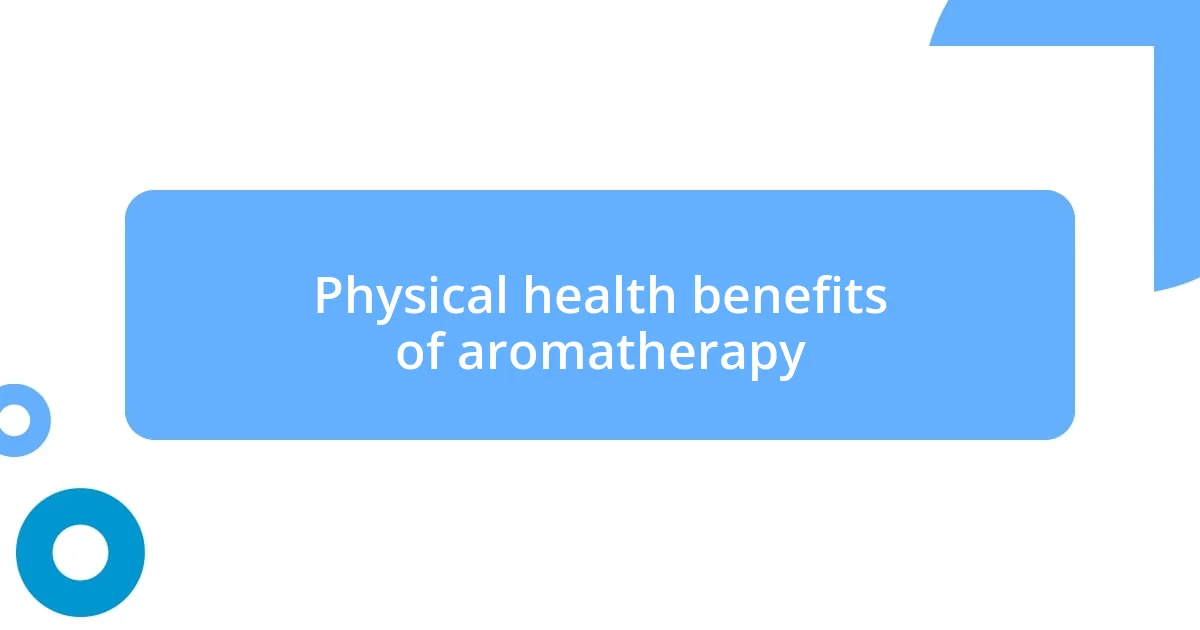
Physical health benefits of aromatherapy
Aromatherapy offers a range of physical health benefits, and I had the chance to experience this firsthand during a particularly stressful season of my life. When I was dealing with persistent headaches, I discovered that eucalyptus oil helped clear my sinuses and eased the tension in my head. I can’t even describe how relieving it was to take a few deep breaths of that invigorating scent—they truly felt game-changing for my physical well-being.
I’ve also found that certain essential oils can help with muscle pain after long workouts. After an intense session at the gym, I would mix a drop of peppermint oil with a carrier oil and massage it into my sore muscles. The cooling sensation paired with the comforting scent not only eased my discomfort but also felt like a rewarding ritual that supported my physical recovery.
Utilizing aromatherapy for digestive issues has been another surprising benefit I’ve encountered. I remember one evening feeling bloated after a heavy meal, and I turned to ginger essential oil for relief. Diffusing ginger helped reduce my discomfort and reminded me of my grandmother’s advice about using natural remedies. It’s moments like these that highlight the profound, practical impact of integrating aromatherapy into my daily routine.
| Aromatherapy Oil | Physical Health Benefit |
|---|---|
| Eucalyptus | Helps clear sinuses and relieve headaches |
| Peppermint | Reduces muscle pain and improves recovery |
| Ginger | Alleviates digestive discomfort |
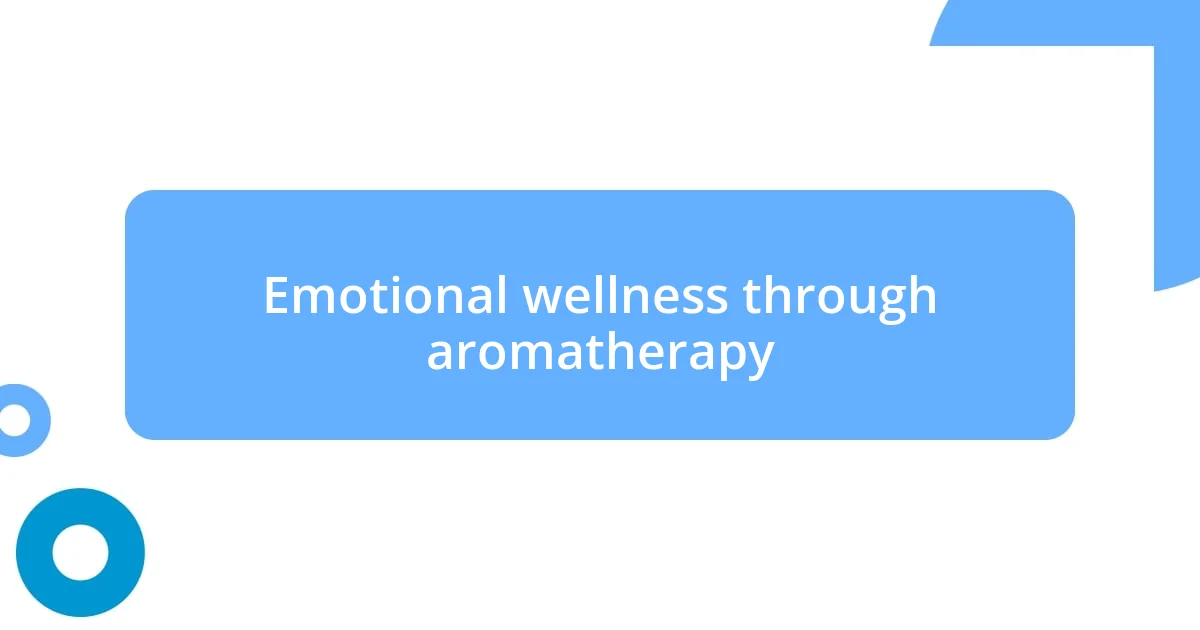
Emotional wellness through aromatherapy
When I first started exploring aromatherapy, I discovered just how powerful scents can be for emotional wellness. One evening, while feeling particularly melancholic, I decided to diffuse some bergamot oil. The light, citrusy scent brightened my mood almost immediately, making my worries feel a little less heavy. It’s incredible how certain scents can awaken feelings of joy or calmness, offering a comforting embrace when life gets difficult.
Aromatherapy can serve as a vital tool for managing stress and anxiety. Here are a few essential oils I’ve personally found effective:
- Lavender: Known for its calming properties, it can promote relaxation and help with sleep.
- Ylang-Ylang: This sweet, floral scent helps create a serene atmosphere and reduces feelings of tension.
- Frankincense: Its grounding aroma aids in reducing feelings of anxiety and enhances meditation practices.
- Citrus Oils (like orange or lemon): Known to elevate mood and increase feelings of happiness.
In my experience, I often turn to these oils during moments of overwhelm to regain my emotional balance. Each session of using them feels like a small act of self-care, a reminder to pause and breathe. There’s something deeply nourishing about integrating these fragrant companions into my daily rituals.
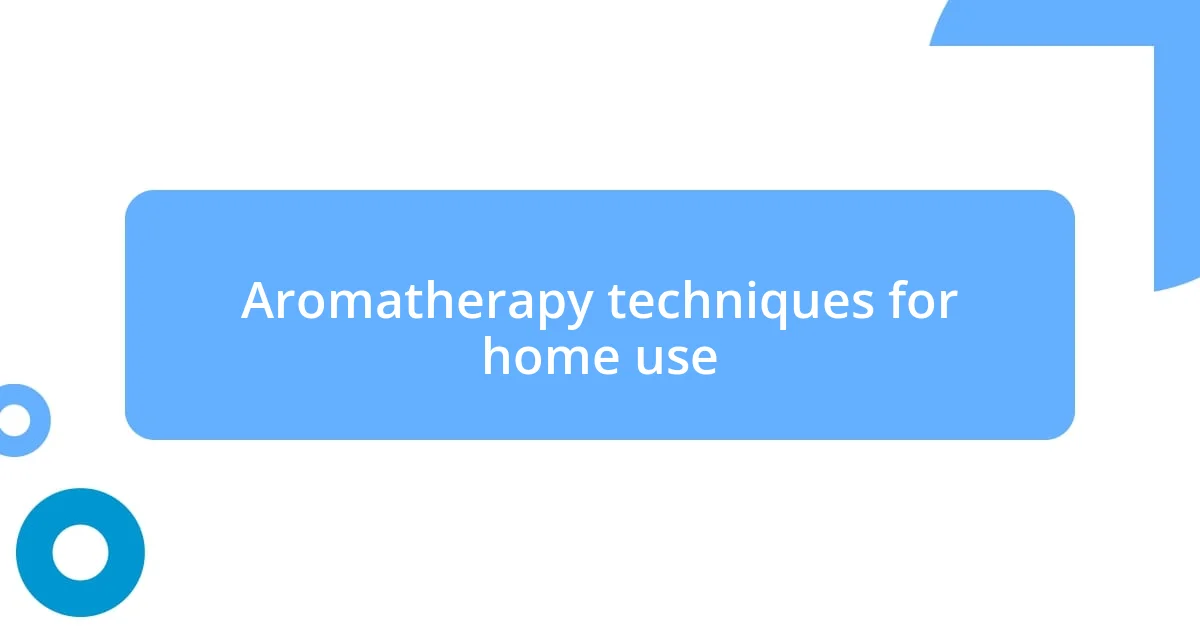
Aromatherapy techniques for home use
I love incorporating various aromatherapy techniques into my home routine. One method I find particularly enjoyable is using a diffuser. I’ll often fill mine with a blend of lavender and chamomile before bed. The gentle mist drifts through the room, transforming the atmosphere into a cocoon of tranquility. Have you ever noticed how the right scent can change your entire mood?
Another technique I’ve embraced is making personalized roller blends. I mix a few drops of my favorite essential oils with a carrier oil, like jojoba or almond oil, and keep them handy. These rollers are perfect for on-the-go stress relief. I often apply a bit of peppermint oil to my wrists when I need a quick pick-me-up during a long workday. It’s a simple yet effective practice that consistently uplifts my spirits.
Lastly, creating aromatherapy-infused bath rituals has been a game changer for my self-care routine. Adding a few drops of eucalyptus or ylang-ylang to my bath water turns an ordinary soak into an indulgent escape. I can still recall one evening, surrounded by warm water and enveloped in calming scents, I felt the day’s stress melt away. Isn’t it wonderful how a few aromatic oils can transform a simple bath into a serene retreat?
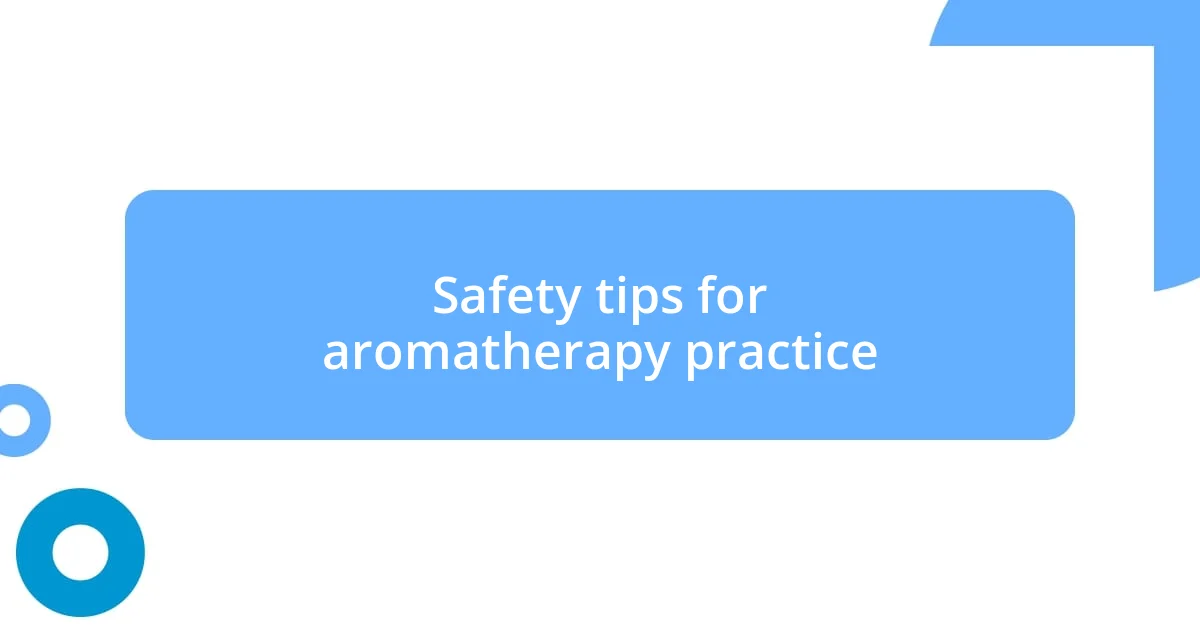
Safety tips for aromatherapy practice
When practicing aromatherapy, ensuring safety is paramount. I remember a time when I accidentally overused an essential oil and felt a bit light-headed. It’s crucial to dilute your essential oils with a carrier oil, especially for topical applications, to avoid skin irritation or allergic reactions. Taking the time to do this not only enhances the experience but also prevents discomfort.
Always perform a patch test when trying out a new essential oil on your skin. I once skipped this step, and while the scent of geranium was delightful, it did not sit well with my skin. By applying a small amount of diluted oil to a discreet area, you can avoid potential adverse reactions and enjoy the benefits worry-free.
Lastly, keep in mind the importance of ventilation, especially when diffusing oils. I’ve learned the hard way that too much concentration of aroma in a small space can become overwhelming. Opening a window or using a fan can help circulate the air, ensuring a pleasant and safe aromatherapy experience. After all, the goal is to create a soothing atmosphere, not a dizzying one!
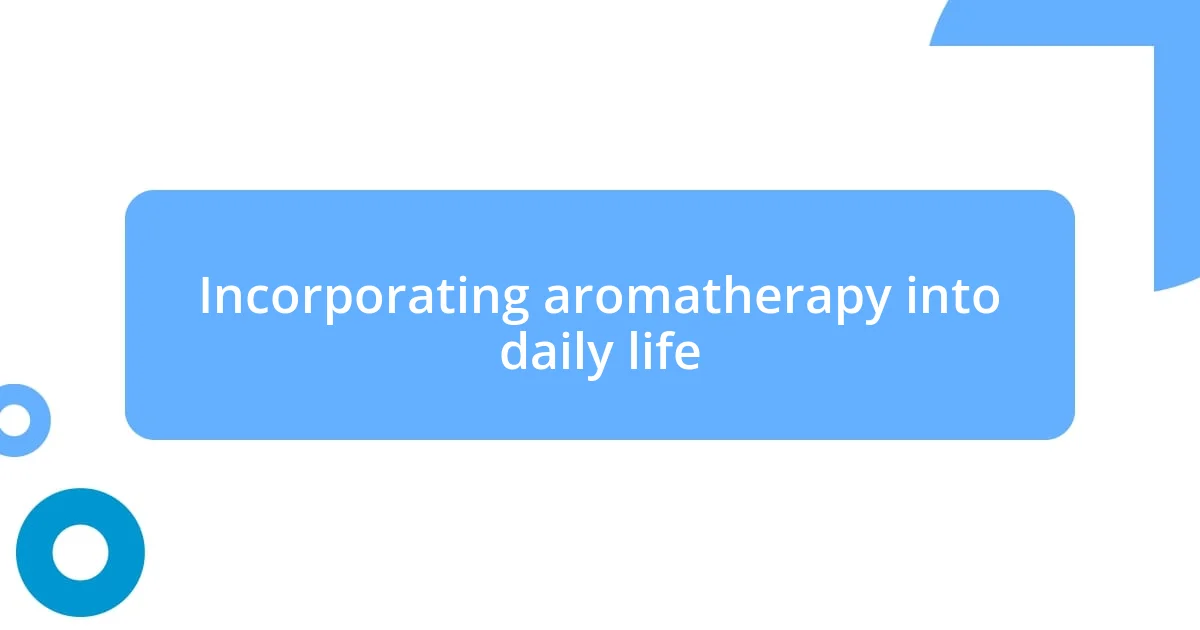
Incorporating aromatherapy into daily life
One of my favorite ways to weave aromatherapy into my daily life is through my morning routine. Imagine waking up to the invigorating scent of citrus in the air—it’s like a burst of sunshine in a bottle. I’ve taken to adding a few drops of orange or grapefruit oil to my morning shower. The fragrant steam revitalizes my senses, setting a positive tone for the day ahead. Have you ever tried starting your day with a little aromatic boost?
Incorporating aromatherapy into my workspace has also made a significant difference in my productivity. A small diffuser on my desk filled with rosemary and lemon oils keeps me focused, while the delightful aroma lifts my spirits. I remember one particularly challenging project; once I switched to this blend, my creativity flowed so much more freely. Isn’t it interesting how certain scents can clear our minds and enhance our output?
Lastly, I’ve found that carrying a small bottle of essential oil with me has become my little secret weapon against stress throughout the day. Whenever I feel overwhelmed, a quick inhale of my beloved lavender oil works wonders for my anxiety. It’s amazing how just a few deep breaths can ground me in stressful moments. Have you ever had a scent that instantly brings you peace? Each time I use it, I’m reminded how accessible and effective aromatherapy can be in our busy lives.













